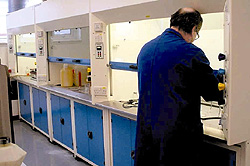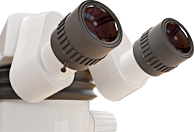Classical Analytical Wet Chemistry
LPD Lab Services offer a wide variety of classical wet chemical analytical techniques and methods. From titrations to Soxhlet extractions, staff have a high level of practical and theoretical knowledge on wet chemical techniques. Some of the methods have been ISO17025 UKAS accredited and alternatively the lab can follow or modify any given method whether it is from a pharmacopeia, an ASTM or another source.
 Below are just some of the types of wet chemistry analysis that LPD Lab Services offer:
Below are just some of the types of wet chemistry analysis that LPD Lab Services offer:
- pH including automated.
- Conductivity.
- Density.
- Viscosity.
- Titrations, both automated and manual, whether it is an acid-base, redox, precipitation or complexometric titration.
- Thin layer chromatography.
- Gravimetric, loss on drying LOD / loss on ignition LOI for moisture, volatile and solids contents using a range of balances and microbalances permitting weighing very small amounts of materials to a high resolution.
- Solvent extraction techniques such as Soxhlet extractions as well as extractables and leachables.
- Chemical tests often looking for the presence of single analytes via colour change or precipitation reactions.
- Colorimetry analysis which can be quantified by use of a UV/Vis spectrometer.
- Moisture content by Karl Fischer Titration.
- Ion determination using Ion Selective Electrodes ISE such as ammonium, fluoride, chloride.
- Derivatisation i.e. the preparation of derivatives of the compound of interest for further analysis by GC, HPLC, UV-visible spectrophotometry, GC-MS etc.
- Routine chemical and materials analysis.
 Much of the wet chemical analysis offered form part of a bespoke testing program put together for an individual client based on input from the lab’s highly experienced staff and be run alongside many of our other techniques such as AAS, ICP-MS, IC, XRF, FTIR, HPLC, GC, GC-MS, UV/Vis, TGA, DSC, SEM/ EDX, XPS, SIMS and AES.
Much of the wet chemical analysis offered form part of a bespoke testing program put together for an individual client based on input from the lab’s highly experienced staff and be run alongside many of our other techniques such as AAS, ICP-MS, IC, XRF, FTIR, HPLC, GC, GC-MS, UV/Vis, TGA, DSC, SEM/ EDX, XPS, SIMS and AES.
Sample Preparation
- Derivatisation i.e. the preparation of derivatives of the compound of interest for further analysis by GC, HPLC, UV-visible spectrophotometry, GC-MS etc.
- Digestion such as acid digestion of metals, or bespoke digestion designed to separate out specific chemical states or compounds.
- Microwave digestion where acid digestion is performed in specialised sealed containers to allow much higher temperatures and pressures to be used.
- Flux digestion for inert metals and materials to ensure complete and accurate quantification.
In addition to the sample preparation techniques listed above, other techniques including, ovens and furnaces, polishing and cross-sectioning, milling, grinding, sieving and homogenisation techniques are also available.
Particle Size Analysis
- Particle sizes of powders separated using vibration sieve sizing.
- Particle analysis by Optical microscopy, SEM and Image Analysis.
- Particle size and size distribution using laser particle size analysis.
Application Notes

